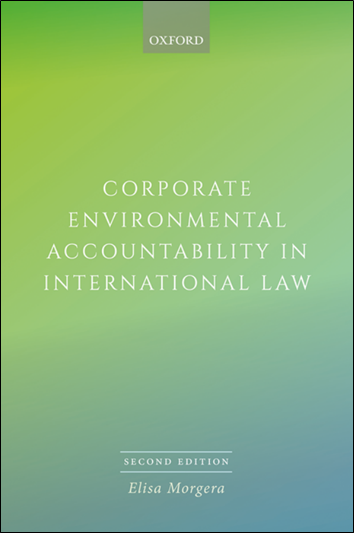Prof Morgera publishes the second edition of Corporate Environmental Accountability in International Law open access
Sept 2020 – Prof Elisa Morgera, member of the Strathclyde Centre for Environmental Law and Governance and Director of the One Ocean Hub, has published a new edition of her monograph analysing the latest international developments on business responsibility to respect environmental rights. The book examines systematically all international sources of corporate accountability standards with specific reference to environmental protection, and elaborates on their theoretical and practical implications for international environmental law.

The book underscores that the progressive development of international law to address corporate environmental accountability and responsibility has intensified since 2010, thanks to the inter-governmental support for the UN Framework and Guiding Principles on Business and Human Rights and the growing international recognition of the inter-dependence of human rights and the environment culminated in the 2018 UN Framework Principles on Human Rights and the Environment. The key findings of the book are that:
- international standards have translated into procedural benchmarks for the private sector on the basis of the general principles of international environmental law (environmental integration, prevention, and precaution), as well as procedural environmental rights (access to information, participation in decision-making, and access to justice), thereby contributing to clarifying businesses’ due diligence to respect human rights;
- substantive standards of corporate environmental responsibility have emerged internationally, notably in relation to how environmental management systems and prevention can contribute to the sustainable use of freshwater, the responsible management of chemicals, waste minimisation, and climate change mitigation;
- substantive standards of corporate environmental responsibility have also emerged to ensure business respect for indigenous peoples’ human rights to natural resources, and business due diligence in relation to biodiversity conservation and the sustainable use of natural resources;
- while there is a significant degree of convergence between all the standards, remaining divergence points to particularly controversial concepts in international law, such as the assessment of cumulative environmental impacts, precaution, free prior informed consent, and agro-ecology, to name a few examples;
- there are several thematic areas where substantive standards of corporate environmental responsibility could be more detailed, such as in the case of climate change, the use of traditional knowledge of indigenous peoples, local communities, women’s and children’s human rights, and the transfer of technology; and
- the relevance and appropriateness of international standards of corporate environmental accountability and responsibility remains to be assessed for ocean conservation and the sustainable use of marine resources .
While there is continued opposition to consider or develop international law directly applicable to multinational companies and other business entities, these international standards represent a conceptual step forward from a traditional understanding whereby international law does not matter for corporations if not through the State. These standards can back up victims’ legal claims and advocacy initiatives; guide States’ regulatory, implementation, and monitoring efforts; and inform judicial practice. They can also guide legal advisory services to private companies, and be included in legal education.
How to access it
The new edition has been published open access as part of the BENELEX project funded by the European Research Council), and can be freely downloaded at https://bit.ly/2Zc1Ovl.